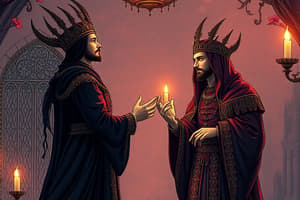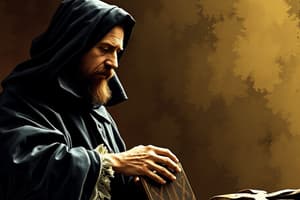Podcast
Questions and Answers
What do the witches' chant, 'Fair is foul, and foul is fair,' primarily introduce?
What do the witches' chant, 'Fair is foul, and foul is fair,' primarily introduce?
How does Lady Macbeth's invocation of supernatural forces reflect her character?
How does Lady Macbeth's invocation of supernatural forces reflect her character?
Which theme does the recurring imagery of darkness symbolize in relation to Macbeth?
Which theme does the recurring imagery of darkness symbolize in relation to Macbeth?
What impact do the supernatural elements have on Macbeth's psyche?
What impact do the supernatural elements have on Macbeth's psyche?
Signup and view all the answers
What does the presence of supernatural forces in Act 1 suggest about the characters' decisions?
What does the presence of supernatural forces in Act 1 suggest about the characters' decisions?
Signup and view all the answers
How does the setting of thunder and lightning contribute to the overall mood of Act 1 Scene 1?
How does the setting of thunder and lightning contribute to the overall mood of Act 1 Scene 1?
Signup and view all the answers
In what way do the witches symbolize chaos in the opening scene of Macbeth?
In what way do the witches symbolize chaos in the opening scene of Macbeth?
Signup and view all the answers
What themes are foreshadowed by the witches in Act 1 Scene 1?
What themes are foreshadowed by the witches in Act 1 Scene 1?
Signup and view all the answers
Explain how the phrase 'fair is foul, and foul is fair' embodies the theme of ambiguity.
Explain how the phrase 'fair is foul, and foul is fair' embodies the theme of ambiguity.
Signup and view all the answers
What role do the supernatural elements play in the conflict between fate and free will in Macbeth?
What role do the supernatural elements play in the conflict between fate and free will in Macbeth?
Signup and view all the answers
Study Notes
Supernatural Influences in Macbeth Act 1
-
Witches' Prophecies:
- The three witches appear early in Act 1, scene 1, setting a tone of foreboding.
- They prophesy that Macbeth will become the Thane of Cawdor and eventually the King of Scotland.
- Their chant, "Fair is foul, and foul is fair," introduces themes of ambiguity and moral confusion.
-
Symbolism of Darkness:
- The witches symbolize unnatural forces and foreshadow chaotic events.
- The recurring theme of darkness represents evil and the unknown, impacting Macbeth’s psyche.
-
Macbeth’s Ambition:
- The witches' predictions ignite an ambitious spark in Macbeth, leading him to contemplate power and fate.
- He begins to wrestle with his moral integrity and the consequences of ambition.
-
Lady Macbeth’s Invocation:
- In Act 1, scene 5, Lady Macbeth calls upon supernatural forces to "unsex" her, seeking to rid herself of feminine weakness.
- She invokes dark spirits to aid in her plot against King Duncan, reflecting her desire to embrace cruelty and ambition.
-
Foreshadowing and Chaos:
- The presence of the supernatural foreshadows the ensuing chaos and moral decay.
- It raises questions about fate versus free will, as Macbeth becomes increasingly influenced by the witches’ words.
-
Causality of Actions:
- The supernatural elements suggest that characters' decisions are influenced by forces beyond their control.
- This serves to heighten the sense of impending doom as Macbeth and Lady Macbeth plot their rise to power.
-
Atmosphere and Tone:
- The involvement of the supernatural creates an eerie atmosphere, establishing tension in the narrative.
- The tone is marked by uncertainty and dread, emphasizing the impact of the supernatural on human behavior.
These elements combine to illustrate the powerful influence of supernatural forces in Act 1, driving the characters towards their tragic fate.
Supernatural Influences in Macbeth Act 1
- The play begins with the three witches, who foreshadow the chaos and moral decay of the play
- The witches' prophecies stir ambition in Macbeth, propelling him towards the path of power
- Their chant, "Fair is foul, and foul is fair," highlights the ambiguity and moral confusion that the play explores
- Lady Macbeth's invocation of dark spirits to "unsex" her shows her desire to embrace ambition and disregard morality
- The recurring theme of darkness symbolizes evil and the unknown, impacting Macbeth's psyche
- Supernatural elements create a sense of uncertainty and dread, shaping the tone of the play
- Macbeth's struggle with free will versus fate is further emphasized by these forces, raising questions about his actions' consequences
Act 1 Scene 1: Supernatural Elements
- The scene opens with a stormy atmosphere, setting a dark and ominous tone.
- The witches' introduction establishes the presence of the supernatural and foreshadows future events.
- The phrase "fair is foul, and foul is fair" introduces a theme of confusion and moral disorder.
- The witches' cryptic dialogue emphasizes the idea of fate and destiny, heightening the sense of ambiguity and uncertainty.
- The witches' prophecies, which are open to interpretation, blur the lines between reality and the supernatural.
- The witches’ prophecies foreshadow the play’s central themes of ambition and moral corruption.
- The supernatural elements evoke a sense of fear and awe, drawing the audience into Macbeth's journey.
- The scene raises questions about free will versus fate, highlighting the powerful influence of the supernatural.
- The witches’ promise to meet Macbeth creates anticipation and intrigue about his future.
Studying That Suits You
Use AI to generate personalized quizzes and flashcards to suit your learning preferences.
Description
Explore the key supernatural elements and themes in Act 1 of Shakespeare's Macbeth. This quiz delves into the witches' prophecies, the symbolism of darkness, and the ambition that consumes both Macbeth and Lady Macbeth. Test your understanding of how these elements set the stage for the unfolding tragedy.




